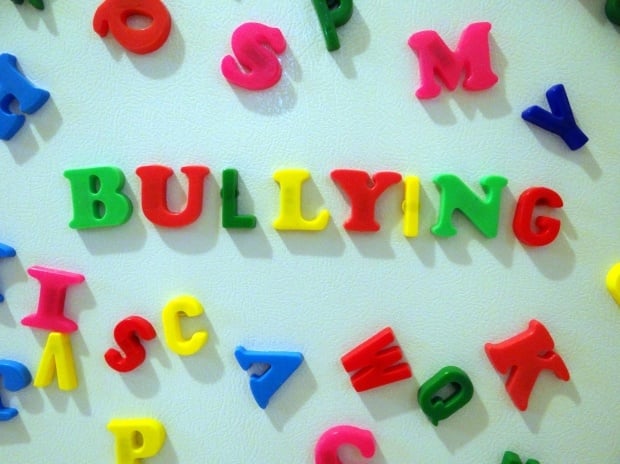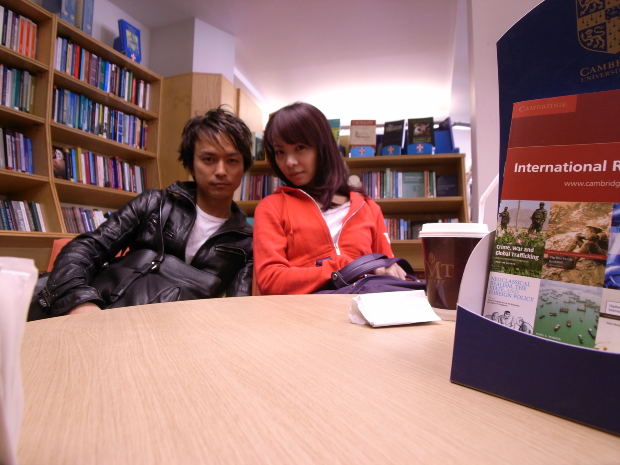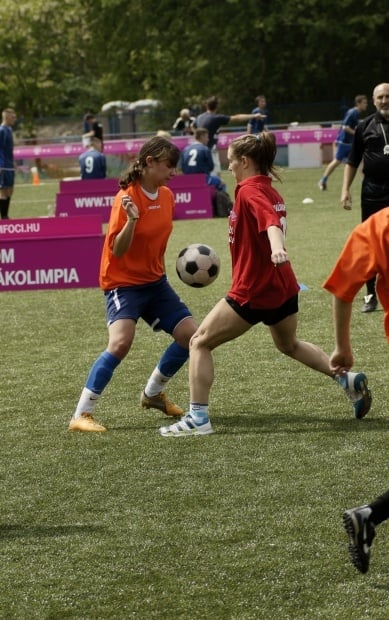The 10 Best Things a Mother Ever Told Her Child

In the modern age of online self-improvement tips and cocky-help books, we seem to have lost our way on some of the almost basic things in life. When I say basic, I hateful the things our mothers (and fathers) have been telling us for as long every bit we can remember. Now, I know that non everybody's parents are clinicians, psychologists and cocky aid gurus. And furthermore, nosotros all know that our parents didn't walk three miles to school, both ways, in the snow, without shoes.
Simply I think that it is pretty condom to say that some of the folk wisdom h anded down from generation to generation was handed down for a reason. It was usef ul and it made sense. Moreover, much of it has at present been shown to exist scientifically audio. Then maybe it's time we turn off our smart phones and tablets and get our information the old fashioned way— by asking our mothers (and fathers). So here are some of my favorite gems of conventional wisdom.
Do information technology until it's done.

It turns out to be true that those of us that show the best task persistence reallypractice meliorate in many areas of life. I frequently hear my own kids request, "How much longer do I have to do this for? How long practice I accept to study? How long do I have to clean my room for? Now I think dorsum to my fairly stress costless childhood, and I know that I had it easy compared to many others of my generation and before, but I call up this: "Y'all do it until you are finished." That might be ane hour. That might be 10 hours. Just you are finished when the job is washed.
It turns out that task persistence matters. So do your best and cease a chore. And when y'all ge t to the point when you think you can't practice any more, think again and go try some more.
Malcolm Gladwell, in his volume Outliers, does a beautiful job of making this point. In one chapter in which he discusses why some people do better than others at mathematics, he goes into our attitudes towards mathematics. Those who give up and say "I tin can't do this. I need you to bear witness me how" non surprisingly don't do besides at mathematics as those who say "I can't do this even so. I need to take a different approach".
Gladwell goes on to describe the TIMSS test, in which every fo ur years an international group of educators administer a comprehensive mathemati cs test to elementary and junior loftier school students around the world. Before the students sit the exam , they make full in a questionnaire which asks them all kinds of questions relating to, for examp le, their parents' level of education, who their friends are, and so on. This is a tedious and demanding questionnaire. In fact it is so tedious that many students leave as many equally x-20 questions bare. The average number of questions answered varies from country to state. Simply here is the interesting part. The number of questions answered on the questionnaire correlates perfectly with the number of questions answered correctly on the actual TIMSS exam. In other words, those who persisted in answering the questionnaire questions also persisted in "figuring out" the maths questions and did better on the mathematics exam as a direct result. So if yous do a thing until it is washed, you volition do much better on mathematics exams, but also in other arenas of life.
It'southward nice to bdue east important, simply it'south more important to be nic e. 

Being prissy costs you aught. But not existence nice is costing us all dearly. There are lots of different iterations of this piece of advice, simply it basically comes downwardly to having respect for people. Over again, in our fast paced mod lives, nosotros are oftentimes so busy that we forget to be nice. This might exist shocking to a generation gone earlier us, merely it is true for many of us today. And we hand this attitude correct down to our own kids and then nosotros are surprised to hear that bullying is on the rise, in the schools, in the workplace and even in old people's homes.
Why are we surprised? It seems to me that what has happened hither is that people take forgotten the importance of beingness nice and that has trickled into every institution we are role of. School systems and other organizations are now required by law to have a "policy on bullying" and a "lawmaking of acquit". Why? Because we are all forgetting to be dainty to such a degree that it is psychologicallydamaging to those around us. Ane American study on the Kansas School System (run into Kansas Communities That Care Survey) constitute that threescore percent of students reported existence bullied.
Teachers in those same schools estimated that approximately 16 percentage of those students were being bullied. That'south quite a discrepancy between what is happening and what teachers are aware of. Some farther interesting statistics on bullying include that a child is bullied every 7 seconds and that xx-30 pct of schoolhouse historic period children are involved in bullying incidents, as either the bully or the victim. Finally, researchers likewise written report that 60 per centum of those characterized as bullies in grades 6-ix had a least 1 criminal conviction past the age of 24. So what has happened here? We are forgetting to exist dainty. Nosotros are and then caught upwardly in beingness important, being pop and getting ahead (in the school grand and the piece of work place) that we take completely forgotten to be nice. This "forgetting" has long term implications for all parties involved.
Instruction is no burden to conduct.

Doing well in school predicts how well you will do in life. While this piece of advice likely brings to mind the wonderful work of author and film maker, Dionne Brand, this is advice that is not but for women and not merely for black women. My parents used to say when I was going to school, "Written report difficult. Learn a lot". And then while maybe this is less eloquent than Pedagogy is no burden to carry , in many means, it makes the same indicate. The more than you know, the further y'all'll go. The better we brainwash ourselves, our children,our society, the more than opportunities nosotros will take.
When you are a kid and looking out the window of your classroom on a sunny day, it might feel like school and studying are a burden. But the fact of the matter is that doing well in schoolhouse predicts how well you volition do in life. The longer you stay in school, the higher your intellectual skills will be. Research has shown that people who score well on IQ tests have more successful jobs, earn more money, and are fifty-fifty happier and healthier. So while we all know examples of famous and successful people who did well in life, we should remember that these are exceptions to the rule, they are not the norm. For most of u.s.a., if you get your head down and work hard in schoolhouse, you volition have a more successful life and y'all will exist happier and healthier also. So didactics is not a brunt. Information technology is a path to success.
Never go anywhere without a good book.

It has been shown in a number of studies that people who read a lot take better developed vocabularies and perform better on cognitive tasks (Cunningham & Stanovich, 1998). The pioneering work of Todd Risley and colleagues has shown us that exposure to a greater number of words through speech and reading has major implications for increasing your later life'due south success. Also, on a practical note, yous never know when you are going to be stuck in a queue at the banking company or doctors office so in the spirit of modernistic twenty-four hour period multi-tasking, let's utilise that time to our advantage. In fact, go ane footstep farther—enjoy that fourth dimension!
Don't look for love in a bar. Expect for love in a library.

Ok, so this one is probably not one you lot have heard before. In fact, the only mother I e'er knew who imparted this wisdom was my own. Beingness a librarian herself, it would only have made senseto her to take someone seriously if you knew that they were interested in learning and books. Just this advice really makes sense on a number of levels, and not just for book lovers. In days of yore in the Western world, and likewise in some modern non-Western cultures, marriages were arranged based on what would best serve each family unit and people only married those people that were acceptable and accustomed by their individual families and within their own social construction. People who got married came from similar cultures with similar value systems and you know what? More often than not, these marriages worked.
So now with all our new fangled notions of romance and freedom, and with all the pick that comes with that, we detect ourselves in the modern world of more complex and cosmopolitan marriages, many of which could certainly non be called traditional. And so nosotros have now got a lot of choice and people are non compelled to doing what culture, society or religion has dictated. For the about part this is a skillful matter, merely let'due south not throw the infant out with the bathwater. In that location is a problem with this mod and advanced system too. We have moved so far abroad from where we accept come, that we don't know what the value system is anymore. This is the problem. One way to counteract this new system full of choice, surprises, and different means of thinking is to seek out people with shared interests and values. Then whether that might be at the lawn tennis club, the church or the library, information technology seems that seeking out a partner who shares your passions and ethics is a good thought. Another good idea is to avoid being inebriated when you lot make these of import decisions!
Don't make such a song and trip the light fantastic toe almost everything.

The way we interpret a problem influences how nosotros deal with it. This adage might be a useful tip for parents or teachers who are tired of hearing everything little matter that happened, every wrongful allegation and every crime done unto their footling ones. Of course, it should be remembered that kids need to vent their woes and they demand someone to listen to them. They need to know that how they think and feel most things matters. But hither's the kicker, the style we interpret an event influences how we go forward.
How do some people confront astringent adversity and trauma and come through to the other side as successful and productive human beings? It definitely has to do with how resilient that person is, but it probably also has something to practise with the way they interpreted the state of affairs in the offset place. It has to do with how they "told their story" and if they made the trauma/adversity the central characteristic of the rest of their lives' story then they can remain stuck there and cannot move on. If, on the other paw, the trauma was merely ane function of a greater life story and if it was interpreted as a "mountain I must climb" rather than "something I cannot accept or cannot overcome", so it is very probable that person is all the same engaged with the trauma, rather than moving on to the next chapter.
Of form, I am in no way minimizing trauma or adversity. Horrible and painful things happen every solar day and these stories need to exist told. Simply know this – how yous write the story will dictate the side by side chapter. Credence and Commitment Therapy (ACT) practitioners view suffering as universal and report that the primary cause of homo suffering is the intrusion of language into areas where it is not functional (meet Hayes, Strosahl & Wilson 1999). In other words, if we "think trauma" all the time, this is not functional and it is not helpful and it will not motion united states of america forwards. Rather, we can get stuck here because our mind tells us "this is trauma" and nosotros react accordingly. So it is our interpretation of the event, rather than the event itself that causes the state of affairs to seem unbearable. And so it seems like the one-time adage, Don't make such a song and trip the light fantastic toe most it, is a helpful i every bit it may help us to move on from difficult situations in life by reminding us not to get wrapped upward in every single event in our lives.
Don't argue with fools or drunks.

If someone is very drunk or very foolish, the chances are, they may not be making sense. Then you could brand some very well idea out and meaningful contributions to an argument. In fact, hands down, y'all could win that argument! But what difference volition it brand? Someone with very fiddling intellectual capacity (whether that be related to as well much alcohol or intellectual disadvantage) may not understand or remember your golden nuggets of truth. So don't waste your time. Grab a skilful book instead.
Respect yourself.

We all hear about boundaries and how nosotros demand to set them for children. Rules and boundaries are useful for a number of reasons when you are working with pocket-sized children, just they are also important for the parents themselves. In the 1960'south,
Psychologist Diana Baumrind conducted some research on parenting and parenting styles which is still widely considered to be of paramount importance in the parenting literature. Baumrind suggested that there are three main types of parenting. These types were authoritarian, authoritative and permissive. Macoby and Martin added a fourth blazon (un-involved) in 1983. Time and time again, the authoritative type of parenting has yielded the best outcomes for children in relation to academic and social and emotional success.
This is largely downward to the fact that this blazon of parenting involves rules and guidelines to be followed, simply parents continue to be warm and supportive. This type of parenting lets children know where they stand, what is expected of them and what will happen if they neglect to comply, but it also models compassion, flexibility and respect. So these parents are respectful of their own children and respectful of their ain needs as people too. So they are modelling the very type of behavior that they look and in and then doing, instruction their children to care for people (and rules) with respect. Because children of authoritative parents know what the rules are, they are also more likely to recognize when those same rules are existence broken subsequently on in life when they are involved in friendships, romantic relationships and when they are involved professionally with work colleagues. So these same children volition have the conviction to respectfully decline to exist involved with people who treat them poorly as they grow into their adult selves.
Eat your vegetables.

Eating well non simply makes you healthier, information technology makes you smarter! Well we all know that what y'all eat makes a difference to your weight, but why else should nosotros eat our vegetables? Well, my Dad often told me that eating carrots would help me to run across in the dark. It's most 40 years later and I all the same don't accept nighttime vision! Just that aside, good nutrition which includes a diet rich in fresh fruit and vegetables, whole grains and lean meats seems to exist a mutual theme even in the faddy diets of celebrities and superstars. Why is this? What properties or health benefits does having a healthy and counterbalanced nutrition confer upon united states?
It turns out that eating well isn't simply about our waistline and information technology'southward not merely near physical health. Eating well can also back up your brain wellness. It can stimulate intellectual development in a way that the fast nutrient life manner simply cannot support. One written report, led past Arthur Agatson (cardiologist and creator of the popular South Beach diet) has published findings (forth with colleagues Hollar, Messiah, Lopez-Mitnik, T Hollar & Almon) showing that improving the nutritional quality of school meals bolstered the academic operation of students over a two year period, in improver to lowering their weight and blood force per unit area. Mathematics scores also improved for this grouping. So eating good for you is not just important for your physical health, but it is too of import for your brain health and bookish development.
Don't drive at that place when you tin can walk there.

Being physically healthy is good for you body and mind. It is pretty commonly known now that nosotros all need to do more than. But this does not have to mean a gym membership. In that location are many things that we can do in our every-twenty-four hour period lives to increase our cardiac action and ane of these is walking places, instead of driving, whenever possible. This besides includes taking the stairs instead of the elevator.
Simply what prove is there that there is a connection between how much nosotros exercise and our overall health and well being? In 2009, the Department of Wellness and Man Services released new guidelines surrounding physical fitness for Americans. These guidelines called for adults between the ages of 18 and 64 to exercise moderately for at least 2 hours and 30 minutes each week or to exercise vigorously for at least an hour and xv minutes weekly. This Section reported that the longer, harder and more ofttimes y'all practice, the greater the physical health benefits including decreasing take a chance of cancer and diabetes. Studies have shown that those who appoint in the recommended amount of do alive an average of three to seven years longer than those who do not.
A study published in the Periodical of the American Medical Association showed that people aged 50 years or older, with memory issues, scored higher on cognitive tests after a half dozen month work-out regimen. This outcome was 20 per centum higher than their sedentary peers and a 10 percent edge was however measured one year afterward the trial ended. Thus, exercising helps both your trunk and your mind.
So where does this exit us? While I don't advise people to believe everything they hear or everything they read, it looks like lots of the stuff our parents take been telling us is actually true. And if you don't believe me, I advise y'all become ask your mother.

Source: https://www.lifehack.org/articles/communication/the-10-best-things-mother-ever-told-her-child.html
0 Response to "The 10 Best Things a Mother Ever Told Her Child"
Post a Comment